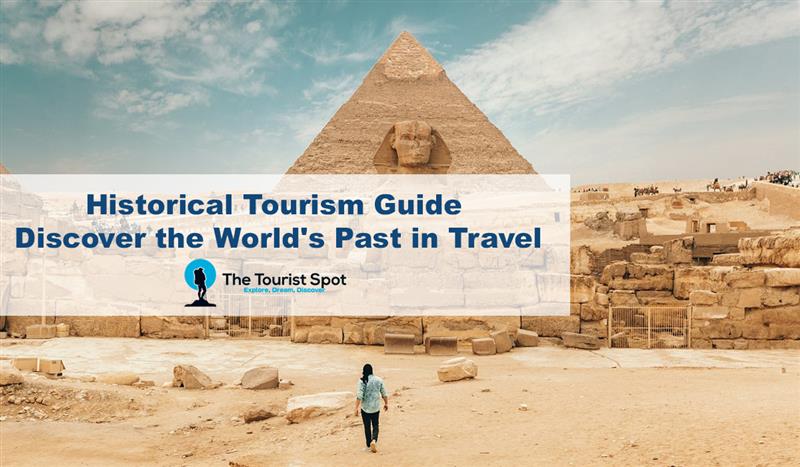Travel is not only about beaches, mountains, or urban adventures. It is also a powerful gateway to the world’s history and culture. Through historical tourism, travelers gain a unique opportunity to connect with the roots of civilizations, walk the paths of empires, and experience stories that shaped the present. Whether it’s standing before the grandeur of the pyramids or wandering through a centuries-old fortress, historical travel is both inspiring and enriching.
This guide explores the best destinations, tips, and reasons why historical tourism continues to attract travelers from all corners of the world.
What is Historical Tourism?
Historical tourism refers to traveling to places of historical significance to explore the past. This includes ancient ruins, battlefields, preserved cities, monuments, palaces, temples, and museums. These journeys let tourists experience eras long gone, learn about world heritage, and see first-hand the art, architecture, and culture of ancient civilizations.
Top Historical Tourism Destinations to Visit
Historical travel brings together education, wonder, and cultural immersion. Below are some of the world’s most iconic historical tourism destinations every traveler should experience:
1. Rome, Italy – The Eternal City
Rome is a living museum. From the majestic Colosseum to the Roman Forum and Pantheon, every corner tells a tale of the Roman Empire’s glory. Cobblestone streets, grand basilicas, and Renaissance art create a layered historical narrative that fascinates every visitor.
- Must Visit: Colosseum, Vatican Museums, St. Peter’s Basilica, Palatine Hill
2. Cairo, Egypt – Land of Pharaohs
For anyone interested in ancient civilizations, Cairo is a top destination. The mighty Pyramids of Giza, Sphinx, and Egyptian Museum offer an unforgettable historical experience. These monuments, built thousands of years ago, still stand in silent testimony to human achievement.
- Must Visit: Giza Plateau, Egyptian Museum, Khan El Khalili Bazaar, Saqqara
3. Athens, Greece – Cradle of Western Civilization
Athens combines classical history with modern life. Walk through ruins that once hosted philosophers like Socrates and Aristotle. The Parthenon and Acropolis are stunning relics of a golden age that shaped modern democracy and philosophy.
- Must Visit: Acropolis, Ancient Agora, Temple of Hephaestus, National Archaeological Museum
4. Kyoto, Japan – Preserving Traditional Culture
Kyoto is a treasure trove of ancient temples, wooden houses, and imperial palaces. It served as Japan’s capital for over 1,000 years and is deeply rooted in tradition, from samurai history to sacred rituals.
- Must Visit: Fushimi Inari Shrine, Kinkaku-ji (Golden Pavilion), Nijo Castle, Gion District
5. Istanbul, Turkey – Where East Meets West
Istanbul has been the capital of three empires – Roman, Byzantine, and Ottoman. The city’s skyline is dotted with minarets and domes, while its streets whisper tales of ancient sultans and crusaders.
- Must Visit: Hagia Sophia, Blue Mosque, Topkapi Palace, Basilica Cistern
6. Machu Picchu, Peru – Lost City of the Incas
Tucked in the Andes Mountains, Machu Picchu is a remarkable Incan city that has mystified historians for centuries. Its strategic location and architectural ingenuity make it one of the most awe-inspiring places in the world.
- Must Visit: Machu Picchu Citadel, Inca Trail, Sacred Valley, Ollantaytambo
7. Delhi, India – Fusion of History and Heritage
Delhi boasts a seamless blend of Mughal, British, and modern Indian influence. From ancient forts to colonial-era buildings, it’s a paradise for history lovers.
- Must Visit: Red Fort, Qutub Minar, Humayun’s Tomb, India Gate
Benefits of Historical Tourism
Traveling through historical sites is more than sightseeing. It’s a deeply meaningful experience that broadens the mind and spirit.
- Educational Value: Learn about art, architecture, warfare, politics, and beliefs of ancient societies.
- Cultural Appreciation: Understand the roots of current cultures and global traditions.
- Personal Enrichment: Walking through time helps travelers reflect on human progress and resilience.
- Photography and Storytelling: Rich visual history and narratives provide exceptional travel content.
Tips for a Successful Historical Travel Experience
To make the most of your historical tourism adventures, consider the following tips:
- Research Before You Go: Understanding a site’s background enhances appreciation and context.
- Hire Local Guides: Many sites offer guided tours that reveal hidden facts and stories.
- Respect the Site: Do not touch, climb, or deface historical structures. Follow local rules.
- Dress Accordingly: Especially at religious or sacred sites, modest clothing may be required.
- Stay Open-Minded: Some histories may challenge modern perspectives—embrace learning.
- Document the Journey: Journal or photograph your experiences to relive and share them.
Lesser-Known Historical Destinations Worth Visiting
While famous sites attract millions, there are lesser-known yet equally mesmerizing historical spots:
- Petra, Jordan – Rose-red city carved into rock
- Bagan, Myanmar – Thousands of ancient temples in the plains
- Valletta, Malta – A fortress city with knights’ heritage
- Luang Prabang, Laos – Colonial buildings and ancient temples
- Zanzibar, Tanzania – East African trade port with Arab influence
These destinations offer rich experiences with fewer crowds and deeper connections to history.
Why Historical Tourism is Trending Again
In recent years, travelers are seeking more meaningful and educational travel. As cultural awareness grows and digital fatigue increases, visiting historical places provides grounding and insight into human legacy. Sustainable tourism practices and better infrastructure have also made historical travel more accessible than ever before.
Conclusion
Historical tourism is a journey through time. It allows travelers to step into the shoes of past generations and see the world through the lens of history. Whether it’s exploring the ruins of empires, walking ancient streets, or marveling at architectural wonders, historical travel fuels the mind, touches the heart, and expands one’s understanding of the world.
Make your next trip more than a vacation. Let it be a discovery of where we came from, how we evolved, and what legacies remain etched in stone, art, and memory.

